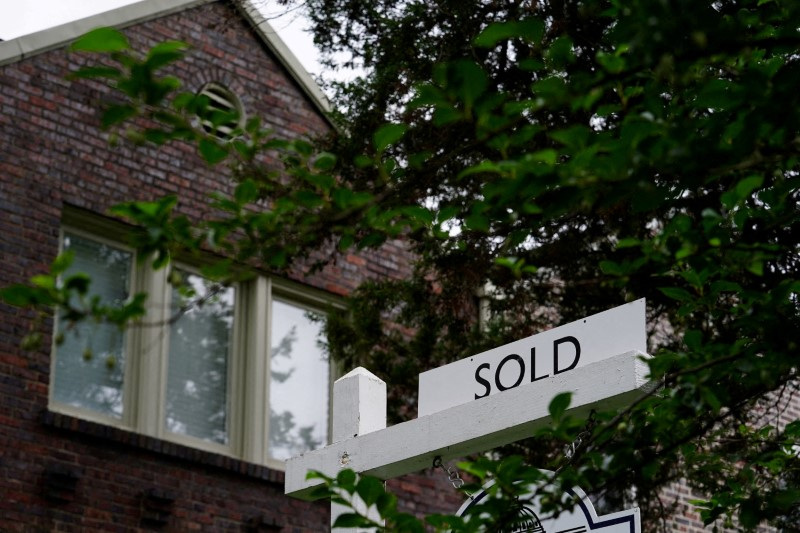By Lucia Mutikani
WASHINGTON (Reuters) -Sales of new U.S. single-family homes fell less than expected in August and could regain momentum in the months ahead as declining mortgage rates and house prices stimulate demand.
The report from the Commerce Department on Wednesday also showed new home sales were higher than previously estimated in the prior three months. The Federal Reserve last week cut interest rates by 50 basis points to the 4.75%-5.00% range, the first reduction in borrowing costs since 2020. Mortgage rates have dropped to the lowest level in more than 1-1/2 years and previously owned homes remain in short supply on the market.
"We expect lower mortgage rates, pent-up demand and a still relatively scarce supply of existing homes despite some recent increases to support modest growth in new home sales over the balance of 2024 and into 2025," said Nancy Vanden Houten, lead U.S. economist at Oxford Economics.
New home sales decreased 4.7% to a seasonally adjusted annual rate of 716,000 units last month, the Commerce Department's Census Bureau said. The sales pace for July was revised higher to 751,000 units from a previously reported 739,000 units. There were also upward revisions to May and June sales data.
Economists polled by Reuters had forecast new home sales, which account for 15.6% of U.S. home sales, falling to a rate of 700,000 units. New home sales are counted at the signing of a contract. They, however, can be volatile on a month-to-month basis. Sales rose 9.8% on a year-on-year basis in August.
New home sales plunged 27.3% in the Northeast last month and dropped 5.8% in the Midwest, which is viewed as a more affordable region. They plummeted 17.8% in the West, but rose 2.7% in the densely populated South.
The median new house price decreased 4.6% to $420,600 in August from a year ago. Most of the houses sold last month were in the $300,000-$499,999 price range.
The new housing market has benefited from a dearth of previously owned homes available for sale, encouraging builders to ramp up construction of new units.
A surge in mortgage rates in the spring, together with higher home prices, however, pushed prospective buyers to the sidelines. That resulted in a jump in the supply of new houses on the market, curbing price gains and discouraging builders from breaking ground on new projects.
Stocks on Wall Street were mixed. The dollar fell to a 14-month low against the euro. U.S. Treasury yields rose.
FALLING MORTGAGE RATES
With the U.S. central bank's policy easing cycle now underway after hiking its overnight interest rate by 525 basis points in 2022 and 2023, mortgage rates are falling.
The average rate on the popular 30-year fixed-rate mortgage dropped to 6.09% last week, the lowest since February 2023, from 6.20% in the prior week, data from mortgage finance agency Freddie Mac showed.
A survey from the Conference Board on Tuesday showed the share of consumers planning to buy a home over the next six months vaulted in September to the highest level since August 2023. Builders also reported this month that they expected higher sales over the next six months.
Some economists, however, cautioned that expectations of lower mortgage rates could see potential buyers continue to linger on the sidelines. Applications for loans to buy a house rose only 1% last week, the Mortgage Bankers Association said in a separate report on Wednesday.
"The immediate impact of the near-promise of lower rates to come is that anyone who can postpone a home purchase probably will, to realize even lower mortgage rates six or 12 months from now," said Carl Weinberg, chief economist at High Frequency Economics. "Recovery of the sector from the recent years of Fed tightening will take a while."
The inventory of new homes increased in August to 467,000, rising back to levels last seen in early 2008, from 459,000 units in July. About 55.7% of the inventory was made up of houses under construction. Completed houses made up 22.5% of supply, with houses not yet started accounting for the remaining 21.8%.

At August's sales pace it would take 7.8 months to clear the supply of houses on the market, up from 7.3 months in July.
"Home builders are still working through built-up inventory from the spring and summer," said Ben Ayers, senior economist at Nationwide. "This healthy level of supply should help to maintain momentum for new sales over the rest of 2024, especially with homebuyer interest piqued by declining mortgage rates."